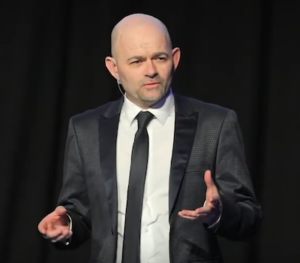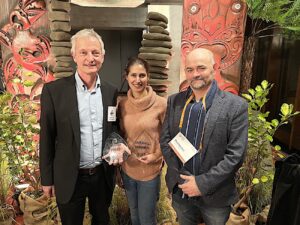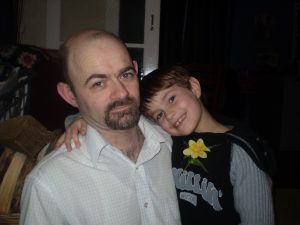
The author pitching at Lightning Lab Electric 2017
I first clapped my ears on Ghost In The Machine, the fourth album in the illustrious career of British rock band The Police, as a spotty faced teenager. The cover art for that album features images of three musicians depicted as a glitchy digital display, alluding to the concept of the human mind taking on a digital persona. Rather prescient when you consider that digital music required a stage full of computing power and miles of spaghetti wiring at the time and that this was almost 15 years before public internet arose. Artificial intelligence existed only in the fertile imaginations of authors such as Isaac Asimov and Arthur C. Clarke and their readers. So what does the future hold for digital ghosts and how do we get our timing right in what is today a rapidly evolving field?
Fast forward to 2017 and I was about to experience a brief rock star moment of my own as I spent the most terrifying five minutes of my life presenting to an audience of corporate bigwigs and various supporters. The kernel of that pitch was that machine based technologies would become integral to utilities services management. Nobody got the point and thanks to the conservative nature of the energy industry incumbents, who were sponsoring our accelerator, the project sank without a trace. We had many”learnings” along the way as a team however and I’m glad I participated.
Only six years later, AI is rapidly embedding in almost every sector and obscene sums are being invested in companies providing a vast array of offerings. For starters the venture capital industry itself is being disrupted by artificial intelligence. Deployment of capital into AI is growing faster than almost every other technology sector right now, according to industry monitor Carta. Notwithstanding some concerns over governance, AI looks set to play an increasing role in our lives.
Timing is a big part of building a successful venture. Sometimes timing is even the most significant factor, regardless of the quality of the team or the idea. I’ve got the timing wrong on more than a few occasions in my life. Ideas alone are worthless without good execution and a bit of good luck as well. In most cases, failing fast is the best possible outcome. If AI really is the ghost in the machine and the timing is right now, I wonder if it will help us be more effective entrepreneurs, govern more wisely and be better guardians of the planet?
Paul Spence is a commentator, researcher and serial entrepreneur, a previous co-founder of a successful New Zealand based global technology venture, co-founder and director of Creative Forest, principal at GeniusNet Research & SondXF and an advisor at ThincLab. You can follow Paul on Twitter/X @GeniusNet or sign up for a free weekly digest of startup, tech and innovation related events co-curated by him through New Zealand Startup Digest.



 What do a vegan Middle Eastern prince and a Singaporean cheese maker have in common? Not a joke. In fact it’s a rather serious question for New Zealand. Earlier this year Saudi based KBW Ventures invested over US $3 million in a “seed” round backing a company that claims to have developed a proprietary technology for producing milk from bovine mammary cells, by hosting the live cells within a laboratory bioreactor. The long term implications of this technology for the New Zealand economy are obvious.
What do a vegan Middle Eastern prince and a Singaporean cheese maker have in common? Not a joke. In fact it’s a rather serious question for New Zealand. Earlier this year Saudi based KBW Ventures invested over US $3 million in a “seed” round backing a company that claims to have developed a proprietary technology for producing milk from bovine mammary cells, by hosting the live cells within a laboratory bioreactor. The long term implications of this technology for the New Zealand economy are obvious. After missing the previous two events due to timetable clashes, the planets aligned and I finally made it to this year’s
After missing the previous two events due to timetable clashes, the planets aligned and I finally made it to this year’s  This week I gave my young son a tearful hug and watched him cross through airport security to join the first leg of a long journey to Europe. I found myself, reviewing the previous eighteen years and wondering whether or not I had done enough for him. His mother and I have a solid friendship now, but we separated when he was just two. So co-parenting presented numerous challenges for us for many years. Not the least of those was that (despite his intelligence) my son sometimes struggled within the school system. At times it broke my heart and I often felt like I badly let him down. But what I have found out since we began researching our new project
This week I gave my young son a tearful hug and watched him cross through airport security to join the first leg of a long journey to Europe. I found myself, reviewing the previous eighteen years and wondering whether or not I had done enough for him. His mother and I have a solid friendship now, but we separated when he was just two. So co-parenting presented numerous challenges for us for many years. Not the least of those was that (despite his intelligence) my son sometimes struggled within the school system. At times it broke my heart and I often felt like I badly let him down. But what I have found out since we began researching our new project  There’s no doubting that, in terms of social impact, Twitter has been a shining beacon of light in a world of largely vacuous and self-absorbed social media content. Therein lies its strength. But considering that the company has received over $1 billion in venture funding since 2007, you would think they might have settled upon a viable business model by now.
There’s no doubting that, in terms of social impact, Twitter has been a shining beacon of light in a world of largely vacuous and self-absorbed social media content. Therein lies its strength. But considering that the company has received over $1 billion in venture funding since 2007, you would think they might have settled upon a viable business model by now. Recently a friend asked me how new companies from a remote location like New Zealand can get noticed in crowded markets on the world stage, without breaking the budget. The answer is simple. Build a fantastic product and love your customers madly.
Recently a friend asked me how new companies from a remote location like New Zealand can get noticed in crowded markets on the world stage, without breaking the budget. The answer is simple. Build a fantastic product and love your customers madly. I’ve always enjoyed those Red Bull ads showing how that fizzy mineral drink gives you a lift. It’s also interesting how Red Bull have successfully leveraged the aeronautical theme in their sponsorships of various high energy sports around the globe such as air racing and Formula One.
I’ve always enjoyed those Red Bull ads showing how that fizzy mineral drink gives you a lift. It’s also interesting how Red Bull have successfully leveraged the aeronautical theme in their sponsorships of various high energy sports around the globe such as air racing and Formula One. The Coatesville police raid and subsequent removal of the
The Coatesville police raid and subsequent removal of the